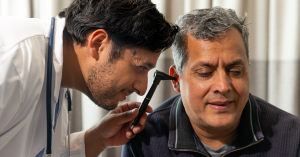Not Just Getting Older—Recognizing the Real Signs of Hearing Loss
You’ve found yourself turning up the TV a little louder. You’re asking people to repeat themselves more often. And noisy restaurants? Forget about it—it feels like everyone’s voice blurs together. It’s easy to chalk it all up to “just getting older.” But is it possible that you’re experiencing age-related hearing loss?
Also known as presbycusis, this gradual type of hearing loss affects nearly one in three people over age 65—and it doesn’t always show up in ways you’d expect. In fact, many people don’t even realize their hearing is changing until it starts affecting their relationships, confidence, or daily life.
So, how do you know if you’re experiencing age-related hearing loss? This article breaks it down for you. You’ll learn the subtle signs to look out for, the science behind why it happens, how to get tested, and what you can do to protect or even improve your hearing.
Because catching it early isn’t just about hearing better—it’s about staying connected, sharp, and in control of your life.
What Is Age-Related Hearing Loss (Presbycusis)?
Hearing loss that occurs gradually as we age is known as presbycusis, and it’s one of the most common conditions affecting older adults. But even though it’s widespread, it’s often misunderstood—and frequently goes unnoticed until it starts disrupting daily life.
How It Happens Over Time
Your ears and auditory nerves, just like every other part of your body, experience wear and tear with age. Age-related hearing loss is usually caused by:
Degeneration of tiny hair cells in the inner ear that help process sound
Changes in blood flow to the ear structures
Long-term exposure to noise throughout life
Genetic predispositions
Ototoxic medications that damage hearing over time
It typically affects both ears and progresses slowly. The first to go are usually high-frequency sounds, which means you might hear the bass of someone’s voice but miss consonants like “s,” “f,” or “th”—making speech harder to understand, not just quieter.
Who Is Most at Risk and Why
Presbycusis is more common in people over 60 years old, but early signs can begin as soon as your late 40s or 50s—especially if you:
Have a history of noise exposure (e.g. loud work environments, concerts, power tools)
Have diabetes, heart disease, or circulatory issues
Take certain medications (e.g. chemotherapy, some antibiotics, loop diuretics)
Have a family history of hearing loss
Unlike sudden hearing loss, presbycusis is progressive and painless, which is why many people don’t notice the early stages until communication becomes noticeably difficult.
Early Symptoms You Might Be Missing
Age-related hearing loss doesn’t always begin with a dramatic drop in hearing. In fact, it often sneaks up on you with subtle changes that are easy to brush off or misattribute to distractions, fatigue, or background noise. But these early warning signs are your cue to take a closer look.
Difficulty Hearing in Noisy Environments
One of the earliest signs of presbycusis is trouble understanding speech when there’s background noise. You might notice:
Struggling to follow conversations at restaurants, family gatherings, or parties
Hearing voices but not being able to distinguish words clearly
Needing to “lip-read” more or ask others to repeat themselves
This happens because the brain has to work harder to separate speech from other sounds, especially when high-frequency hearing is reduced.
Mishearing Words and Needing Repetition
People with early age-related hearing loss often find themselves:
Confusing words like “fifty” and “sixty,” or “cat” and “hat”
Asking “What?” or “Can you say that again?” more often
Complaining that others are “mumbling”—even though the issue lies in the clarity, not the volume
It’s easy to dismiss these moments as normal lapses. But if you notice them becoming more frequent, or if loved ones comment on it, your ears may be sending a message.
Other subtle signs to watch for include:
Turning up the TV louder than others prefer
Straining to hear during phone calls
Feeling mentally tired or frustrated after long conversations
Next, we’ll look at how these subtle symptoms start to affect your day-to-day life, relationships, and confidence.
How It Affects Daily Life and Communication
Hearing loss isn’t just about missing a few words—it can gradually reshape your daily life, your relationships, and even your emotional well-being. As age-related hearing loss progresses, its real impact often goes far beyond your ears.
The Social and Emotional Impact
Many people don’t realize how much hearing loss contributes to:
Social withdrawal: Conversations become exhausting, and rather than asking others to repeat themselves, you may start to avoid group settings altogether.
Feelings of isolation: You may feel left out or disconnected, especially in family events or work meetings.
Frustration and embarrassment: Constantly asking “What?” or responding inappropriately can be discouraging.
Increased anxiety or even depression, particularly when communication begins to break down with close friends and loved ones.
These emotional effects aren’t just inconveniences—they can have serious consequences for mental and cognitive health, especially if left unaddressed.
Warning Signs from Your Family and Friends
Often, the people around you notice hearing loss before you do. You might hear comments like:
“You didn’t hear what I said, did you?”
“You keep turning the TV up way too loud.”
“You’re always asking me to repeat myself.”
These comments, though sometimes frustrating, are often the earliest signs that your hearing is starting to slip. And because hearing loss happens gradually, many people adapt to the change without realizing how much they’ve lost.
The key message? If communication feels harder than it used to—don’t ignore it. The next section will explain how to get a clear, accurate diagnosis and what a hearing test can really tell you.
Getting a Proper Diagnosis
If you suspect you’re experiencing age-related hearing loss—or if others have pointed it out—it’s time to move beyond guesswork. Getting your hearing professionally evaluated is simple, non-invasive, and incredibly revealing.
When to Get Your Hearing Tested
You should schedule a hearing test if you’ve noticed:
Trouble following conversations in noisy places
People’s voices sound muffled or unclear
You’re frequently asking for repetition
Others complain the TV or radio is too loud
You feel mentally exhausted after social interactions
Even if symptoms seem mild or infrequent, an early hearing test provides a baseline—so future changes can be tracked and managed more effectively.
Pro tip: Adults over 50 should consider annual hearing screenings, even without obvious symptoms.
What Hearing Tests Can Reveal
An audiologist or hearing care professional will guide you through a few key assessments:
Pure Tone Audiometry: You wear headphones and respond to sounds of different pitches and volumes to map your hearing ability in each ear.
Speech Recognition Testing: This evaluates how well you can understand spoken words, both in quiet and noisy environments.
Tympanometry: Measures the movement of your eardrum to check for blockages or fluid buildup.
Discussion of lifestyle and hearing habits: Helps determine whether your difficulties align with presbycusis or another hearing issue.
The results will be displayed on an audiogram, a chart that shows your hearing sensitivity across different frequencies. If presbycusis is present, it usually shows up as gradual high-frequency loss in both ears.
From there, your provider will recommend the best next steps, whether it’s monitoring, lifestyle changes, or hearing aids.
Next, we’ll explore your treatment options and how to make daily life easier with age-related hearing loss.
Treatment Options and Lifestyle Adjustments
While age-related hearing loss (presbycusis) can’t be reversed, there are effective treatments and strategies that can help you manage symptoms, improve communication, and maintain a high quality of life.
Hearing Aids and Assistive Devices
For many people with presbycusis, hearing aids are a game changer. These small devices amplify sound and improve speech clarity, making it easier to follow conversations, especially in noisy environments.
Digital Hearing Aids: Most modern hearing aids are digital and can be adjusted to match your specific hearing needs. Many come with features like noise reduction and directional microphones to help in crowded places.
CROS and BiCROS Hearing Aids: If you have severe hearing loss in one ear (unilateral hearing loss), these devices can transmit sound from your non-hearing ear to the better ear, helping you hear more naturally.
Other assistive listening devices (ALDs), like amplified telephones or TV streamers, can also enhance your ability to hear in specific situations, reducing frustration and increasing independence.
Coping Strategies for Everyday Life
In addition to using hearing aids, consider these strategies to make daily life easier:
Optimize Your Environment:
Reduce background noise when possible.
Face people when speaking, so you can read facial expressions and lips.
Ask for clarification when you don’t understand something. Most people are happy to repeat themselves or speak more clearly.
Communication Tips:
Speak clearly and at a moderate pace—don’t shout, as this can distort speech.
Use visual cues like body language or gestures to supplement spoken words.
In group settings, sit close to the speaker and position yourself so that your better ear is directed toward them.
Assistive Listening Devices:
TV Streamers: Devices that connect your hearing aids to your TV and stream sound directly into your ears.
Personal Amplifiers: Handheld devices that amplify voices in specific situations like one-on-one conversations or meetings.
Preventing Further Decline
While you can’t stop presbycusis entirely, there are ways to slow down its progression:
Avoid loud noises: Use ear protection if you’re exposed to loud environments like concerts, construction sites, or power tools.
Healthy lifestyle: Exercise, a balanced diet, and controlling conditions like high blood pressure or diabetes can help preserve hearing function.
Regular hearing checkups: Annual hearing tests help track changes early, so adjustments can be made before you notice a problem.
Living with age-related hearing loss doesn’t mean isolating yourself from social activities or being left behind. With the right treatments and adjustments, you can stay connected, engaged, and confident.
Conclusion: Your Hearing Deserves Attention—Don’t Wait to Take Action
Age-related hearing loss might start quietly, but its impact can grow over time—affecting how you connect, communicate, and enjoy life. The good news? You don’t have to accept it as just another part of getting older.
By recognizing the early signs, getting a proper diagnosis, and exploring treatment options, you can stay ahead of hearing decline and take control of your communication and confidence. Whether it’s tuning in at social events or hearing your grandchild’s laugh clearly, your hearing plays a vital role in your world.
So if you’ve been wondering, “How do I know if I’m experiencing age-related hearing loss?”—you already took the first step by asking. Now, take the next one by booking a hearing test and learning your options.
Because your hearing matters—and it’s never too early to care for it.
Frequently Asked Questions
Is hearing loss a normal part of aging?
Yes, age-related hearing loss—also known as presbycusis—is a natural part of aging for many people. It affects about one in three adults over 65. That said, early detection and treatment can help you manage it effectively and maintain a high quality of life.
What age does hearing loss usually start?
Presbycusis can begin as early as your late 40s or 50s, but it becomes more noticeable in your 60s and beyond. The progression is gradual, which is why many people don’t recognize the signs right away.
Can age-related hearing loss be reversed?
No, age-related hearing loss cannot be reversed. However, it can be successfully managed with treatments like hearing aids, assistive devices, and communication strategies. The sooner you take action, the better the outcome.
Do I need hearing aids if I only struggle in crowds?
Possibly. One of the earliest signs of age-related hearing loss is difficulty hearing in noisy environments. Hearing aids can help improve speech clarity in these settings and reduce mental fatigue. A hearing test can determine if you’d benefit from them.
How often should I get a hearing test?
If you’re over 50, it’s recommended to have a hearing check at least once a year. More frequent tests may be needed if you’ve already been diagnosed with hearing loss or use hearing aids.
Will it get worse if I ignore it?
Yes. Untreated hearing loss can lead to:
Worsening symptoms over time
Cognitive decline and memory issues
Social isolation and depression
Greater difficulty adjusting to hearing aids later on
Getting help early leads to better results and helps protect your overall well-being.






